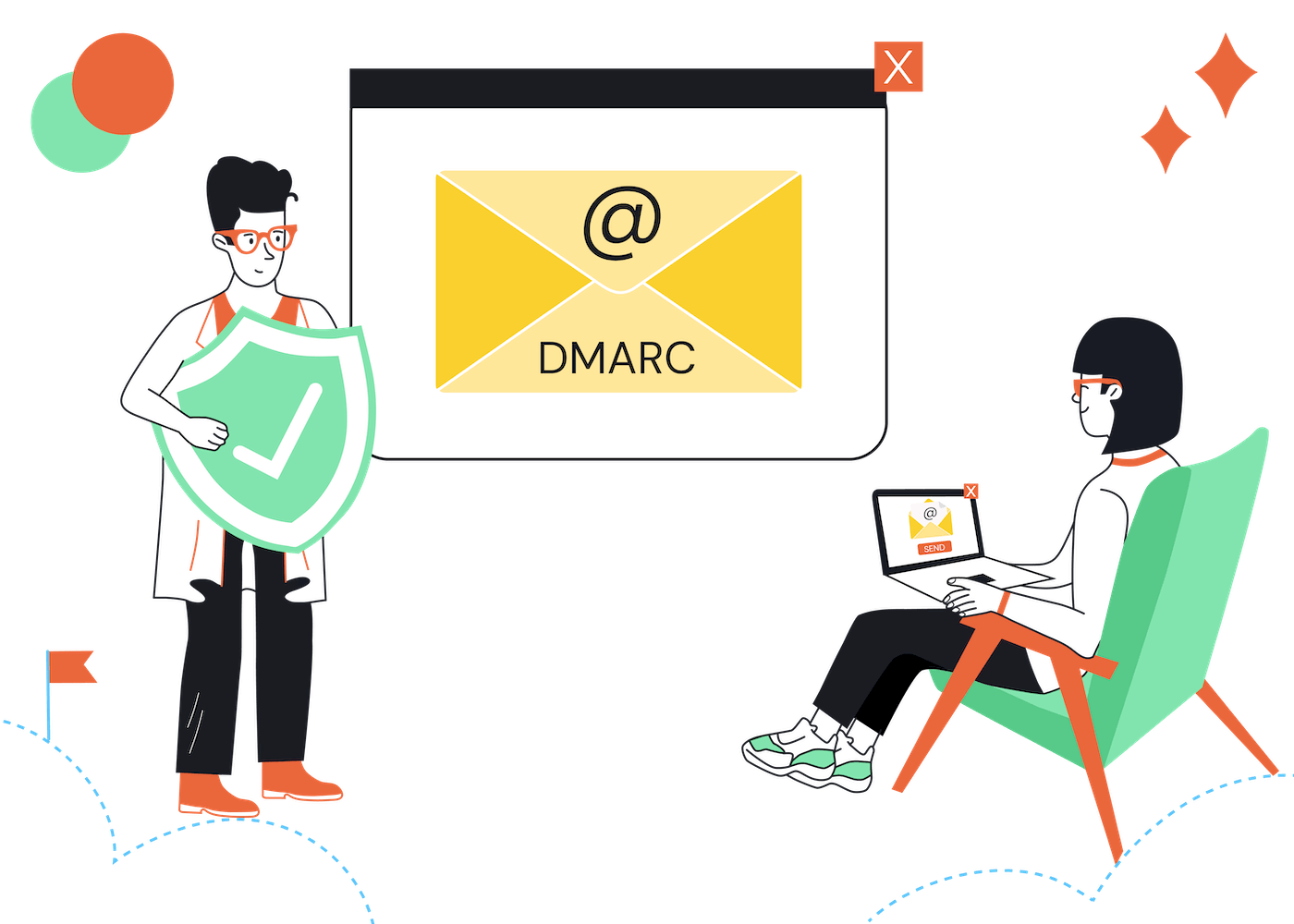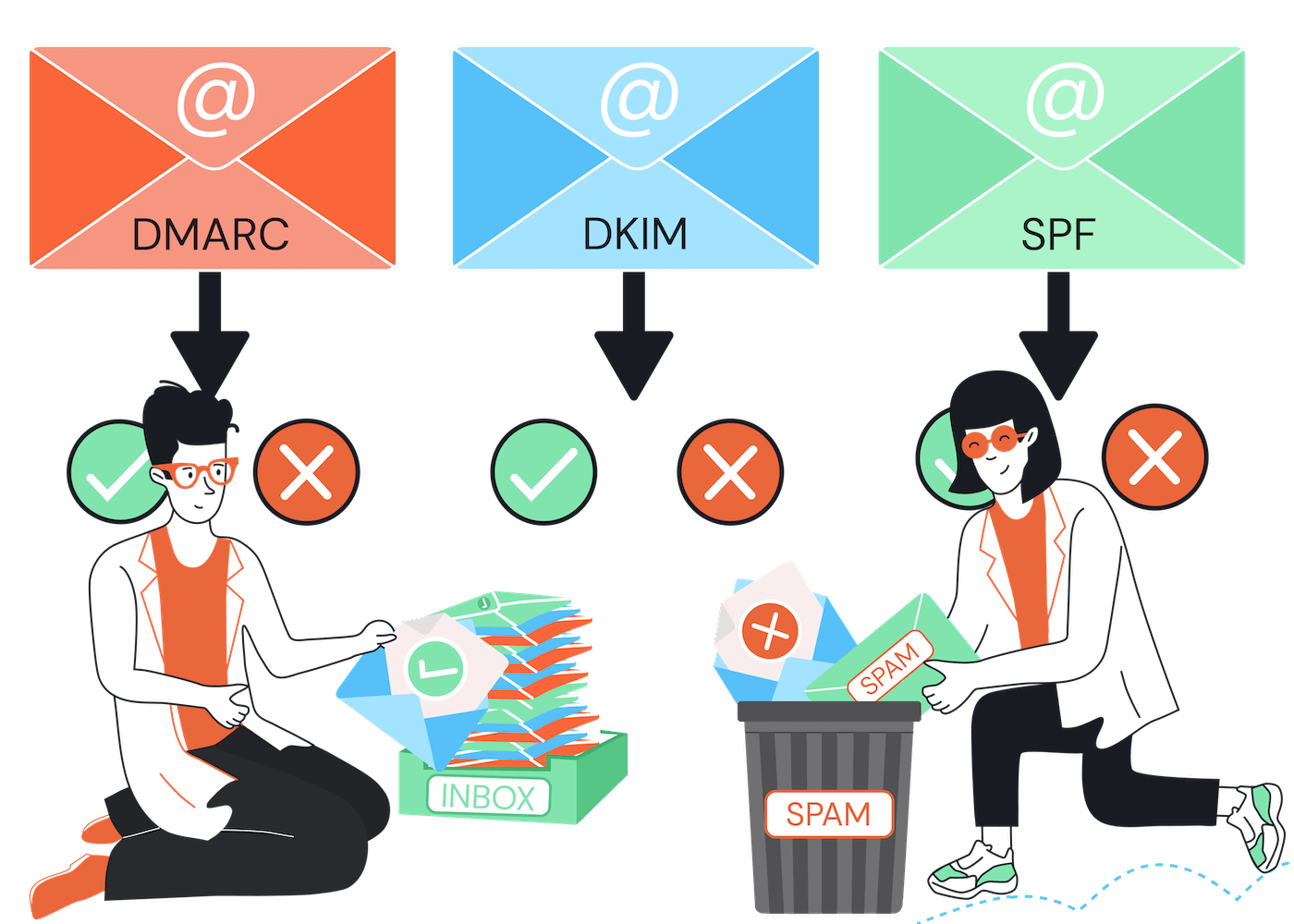As an email marketer, implementing a DMARC (Domain-based Message Authentication, Reporting, and Conformance) record could be very beneficial for your email marketing campaigns.
DMARC is a protocol that uses SPF (Sender Policy Framework) and DKIM (DomainKeys Identified Mail) to determine the authenticity of an email message (check out our DMARC vs DKIM vs SPF article for more information on the relationship between the 3 standards).
While not essential, there are several reasons why a DMARC record is a wise choice for email marketers.
Advantages of having a DMARC record
- Enhances Email Deliverability: DMARC helps in ensuring that your emails are authenticated against SPF and DKIM standards. This authentication process increases the likelihood of your emails being delivered to the recipient's inbox rather than being marked as spam or getting blocked by email providers.
- Protects Brand Reputation: By preventing unauthorized parties from sending emails that appear to come from your domain, DMARC helps protect your brand from being associated with phishing attempts or spam. This protection is crucial for maintaining the reputation of your brand.
- Gives Visibility into Email Channels: DMARC policies allow you to receive reports on email sending activities associated with your domain. These reports provide insights into legitimate and illegitimate email sending sources, enabling you to identify and address potential vulnerabilities or unauthorized use of your domain.
- Improves Customer Trust: Customers are more likely to trust emails that successfully pass DMARC checks, as this indicates the email genuinely originates from the claimed domain. This trust can lead to higher engagement rates with your email campaigns.
- Regulatory Compliance: Depending on your industry and the regions you operate in, there may be regulations requiring you to take steps to secure your email communications. Implementing DMARC can be part of complying with such regulations. For example, DMARC is now compulsory for Shopify sellers.
More recently, Gmail and Yahoo made DMARC authentication a requirement for mass senders hoping to reach Gmail and Yahoo-hosted email accounts. This makes having a DMARC record more important than ever for email marketing, especially if your list has over 5,000 subscribers.
This video also does a good job at explaining why having a DMARC record is a good idea:
So, the benefits of implementing a DMARC record are clear. However, there are also some potential challenges that you should be aware of (and be prepared to mitigate).
Challenges of having a DMARC record
- Strict Policies Leading to Legitimate Email Rejection: If DMARC is configured with a strict policy (p=reject), legitimate marketing emails might be rejected if they fail DMARC checks due to configuration errors or misalignment issues with SPF and DKIM. This can result in reduced deliverability and impact marketing campaigns.
- Configuration and Maintenance Overhead: Implementing and maintaining DMARC, along with SPF and DKIM, requires technical expertise and ongoing management. Email marketers need to ensure their email authentication records are correctly set up and updated to accommodate changes in their email sending practices. This can be resource-intensive, especially for smaller organizations without dedicated IT support.
- Forwarding and Third-party Sending Issues: Email forwarding and the use of third-party email service providers (like Mailchimp or ActiveCampaign), can complicate DMARC compliance. Forwarded emails may fail DMARC checks if the forwarding process modifies the email in a way that affects SPF or DKIM validation. Similarly, when using third-party services to send emails on behalf of your domain, ensuring alignment with DMARC policies requires coordination and might involve additional setup steps.
- Risk of Missing Fraudulent Activity Reports: DMARC includes mechanisms for receiving feedback about emails that fail authentication checks. However, if an organization does not actively monitor and analyze these reports, they may miss critical information about phishing attempts or configuration problems. This oversight could lead to unaddressed vulnerabilities or misinterpretations of email campaign performance.
- Possible Impact on Email Reputation: Incorrect implementation of DMARC can inadvertently affect an organization's email reputation. If receivers frequently encounter authentication failures from your domain, it could lead to a lower sender reputation, affecting overall email deliverability.
- Learning Curve and Implementation Challenges: Properly implementing DMARC policies and understanding the nuances of how it interacts with SPF and DKIM can be challenging. Missteps during setup can lead to unintended email delivery issues, including the loss of legitimate communication with customers.
While these challenges and drawbacks may seem significant at first glance, most of them can be made insignificant by proper implementation and maintenance of your DMARC record.
If you make sure you’re carrying out the following steps, then you should be OK:
- Configure DMARC correctly with the appropriate policy settings
- Invest some time in keeping your DMARC settings up to date
- Regularly check for any changes in third party tools that you’re using
- Actively monitor and react to the DMARC reports that you receive
And, let’s face it, these are the sort of basic responsibilities you should always undertake when you start to use any new tool or protocol.
In summary, while a DMARC record is not mandatory for email marketers, it is highly recommended if you want to maximize your chances of getting your emails delivered.
Implementing DMARC can significantly improve the security and effectiveness of your email marketing efforts. It helps ensure your emails reach your audience, protects your brand's reputation, and builds trust with your customers.
If you need any help with creating and implementing a DMARC record, check out our email authentication service.
And for further reading, try our guide to email authentication or our tips on why your emails are going to spam.
Our Methodology
This article has been written and researched following our EmailTooltester methodology.
Our Methodology





